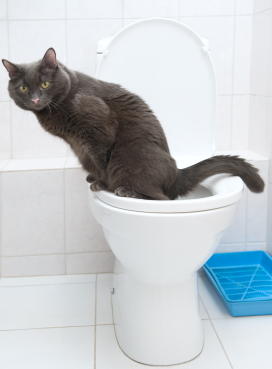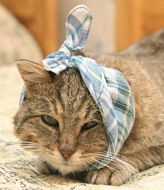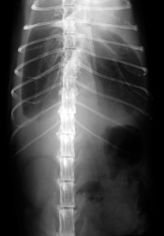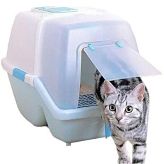Cat Constipation

Cat Constipation is a term that gets used loosely but it is really three distinct conditions: constipation, obstipation, and megacolon. Although they have some similarities they also have significant differences so veterinarians treat them differently.
Constipation and obstipation are the most closely related conditions. Although constipation is not a disease it is an indicator that your cat has gastrointestinal tract problems. Recognizing the early stages of this disorder can be hard when you have more than one cat such as I do. The two calicoes share a litter box on the upper floor and the other three share a litter box on the main floor. Who is doing what...is a guessing game.
So, like most of us you may not notice there is an issue until its further advanced. Obvious signs of distress such as frequent trips to the litter box, straining to defecate and other behaviors which include crying and licking the genital anal area. As the cat constipation continues, the cat may lose its appetite, become lethargic, look unkempt and begin to crouch and hunch up because of abdominal discomfort. The time has come to call your vet. The call is later than ideal, but definitely necessary.
Cat constipation is the stage when the cat has obvious difficulty passing a stool. Obstipation is when the cat is very blocked, severely impacted, and unable to have an bowel movement. The causes of both of these problems are many, including diet (ingesting hair, foreign objects like small toys, bones) and environment (a dirty litter box, lack of exercise, hospitalization).
Cat constipation can also be caused by an obstruction from a tumor or improperly healed pelvic fractures that restrict movement through the intestines as well as medicines for other problems. Obese cats can become constipated so watch their weight.
The third condition is megacolon. Chronic cat constipation and obstipation from specific causes can result in a distended colon that has poor movement. Sometimes megacolon occurs when the muscular movement of the colon wall, which propels fecal material through the colon diminishes for some unknown reason. As a result, fecal matter comes to a standstill in the colon where it becomes drier and harder. Over time the enlarged impacted colon loses most of its muscular ability. Surgery is often recommended.
Treatment
First, it is necessary to relieve the cat constipation and, second, try to prevent it from happening again either by removing the cause or by medical management. Relief for the cat can occur naturally through induced defecation or, if the cat is severely impacted, through gentle, manual removal of the feces under anesthesia. Great care has to be taken to avoid tearing the colon.
Any cat that has been constipated for several days may also be dehydrated. So before starting any procedure, your vet may give your cat intravenous replacement fluids because if this isn't taken care of, the cat will become constipated again in a few days.
Once the cat's problem has been taken care of, most vets will put the cat on a medical maintenance program. If your situation is minor you can obtain pet laxatives at your local pet store or there are reliable vendors listed on the Pet Products Page.
Medical Maintenance Program
There are two avenues of maintenance on this program. There is dietary and there is medical. The dietary involves putting the cat on a higher fiber diet. Fiber absorbs water thereby creating looser, bulkier stools. You should introduce the dietary change gradually over a week. If you switch your cat too quickly onto a high-fiber diet, your cat may become very uncomfortable with gas pains.
There are therapeutic diet items in pet food stores and your vet may also carry a selection. Water consumption is very important for the constipated prone cat. Realize that canned food has a higher water content than dried food and that milk can have a laxative effect in some cats.
The medical component of management usually consists of a laxative regimen such as stool softeners. Lubricants soften the stool by coating the feces (preventing water absorption) and oiling the path making it easier for the cat to defecate.
The most common lubricant is white petroleum which is used in a lot of hairball products. Some cats will lick it off your fingers or off the roof of their mouth...if you can get it in there. Lubricants are used in the treatment of minor constipation. Emollients help mix water and fat thus softening the stool. They are useful in certain situations such as when defecation is painful.
Osmotics enhance water retention, thereby softening the stool. Many veterinarians favor a compound called lactulose, and plain old milk works in lactose-intolerant cats. Stimulants are cathartic laxatives that target specific sites in the intestines. While not the laxative of choice for most cases of chronic constipation, stimulants can be useful when a vet prepares a cat for a diagnostic procedure.
Prokinetics are stimulants that stimulate movement within the large intestine. A lot of vets favor cisapride in combination with other therapies, to treat chronic constipation. Enemas such as Fleet pediatric enema can be deadly for a cat. DO NOT administer an enema. Your vet can administer it if they deem it to be the solution, which it usually is not.
Managing a cat with chronic constipation issues requires a combination of medical and dietary approaches. When medical management is no longer a satisfactory option...for cats with megacolon related constipation, there is the surgery option. The surgery...a subtotal colectomy...removes most of the colon, then reconnects the remaining ends, allowing the cat to defecate normally. There is a small risk that there will be a leak where the ends are rejoined, but this is rare and corrective surgery can be done.
Owners whose cats have a single bout or even a second bout of constipation probably don't have to worry about this issue. However, for those owners with cats who have chronic constipation, it does require constant attention.
Related Articles......
Return from Cat Constipation to Cat Health Homepage
Having trouble finding what you need? Cat Health Index & Site Map
OR
Do you have a question to ask?...Questions
OR
Do you have a cat story to share?...Simply click here to go to that page!
Copyright@2010-2020 All rights reserved.Cat-health-detective.com
This website is information only. Consult a veterinarian for medical assistance

"Like Us" on Facebook
or...
"Like Us" here




















